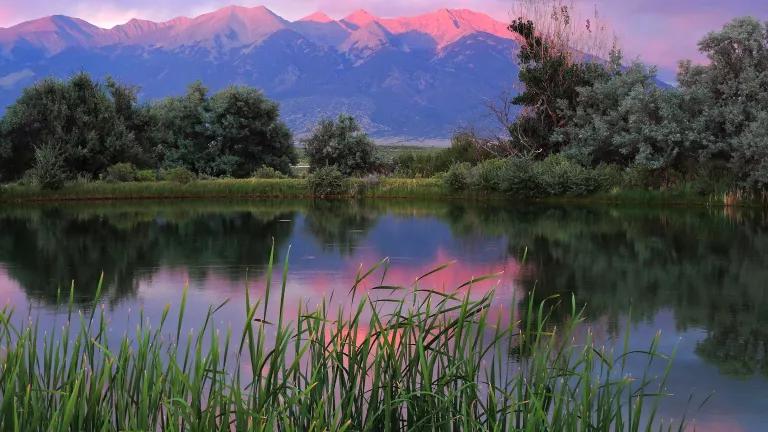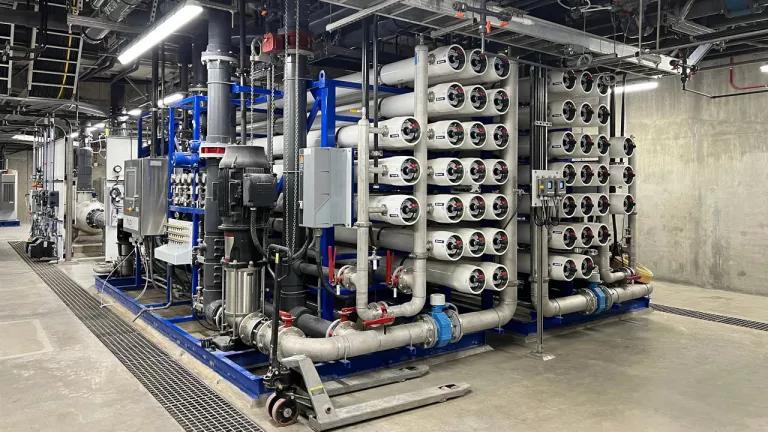
Readers of my blog (hi, Mom!) will recall that the Senate recently voted on two measures to gut the landmark Clean Water Rule and to prevent the Environmental Protection Agency and Army Corps of Engineers from adequately protecting critical water bodies in the future. As I previously discussed, these attacks failed to garner enough votes to become law. One measure did not get the required 60 votes to pass and the second one - though it passed - will surely be vetoed if it reaches the President's desk, and opponents of the Clean Water Rule lack sufficient votes to overrule that veto.
This post takes a closer look at these votes and how individual Senators came down. It's important to do so for two reasons: (1) so you can let your Senator know what you think of his/her vote; and (2) because Congressional leaders and the President are currently trying to agree on a bill to fund the government through next September, and opponents of the rule want to insert a provision - known inside the Beltway as a "rider" - attacking the Clean Water Rule in that bill, and the only way to stop that from happening is to let your members of Congress and the White House know that you won't support a Republican effort to force another government shutdown in exchange for pro-polluter rollbacks. Please make yourself heard! Here's a list providing Senators' contact information so you can call their offices.
Big industry associations that represent operations that discharge pollution into the nation's waterways are teaming up to try to jam this rider onto the spending bill, as revealed by a recent strategy session that reportedly included the Edison Electric Institute, the American Forest and Paper Association, the National Association of Home Builders, the National Rural Electric Cooperative Association, and the American Farm Bureau Federation. To fight this industry attack on the Clean Water Rule, we need the millions of Americans who benefit from clean water to push back, from the parents whose households get drinking water dependent on sources the rule would better protect (as 1 in 3 Americans do), to small businesses that rely on clean water, to hunters and anglers who use these water bodies and who participate in a $200 billion hunting and fishing economy.
With that background, let's go to the scoreboard...
- Senators voting for clean water by opposing both bills attacking the Clean Water Rule: Baldwin (D-WI); Bennet (D-CO); Blumenthal (D-CT); Booker (D-NJ); Boxer (D-CA); Cantwell (D-WA); Cardin (D-MD); Carper (D-DE); Casey (D-PA); Coons (D-DE); Durbin (D-IL); Feinstein (D-CA); Franken (D-MN); Gillibrand (D-NY); Heinrich (D-NM); Hirono (D-HI); Kaine (D-VA); King (I-ME); Klobuchar (D-MN); Leahy (D-VT); Markey (D-MA); Menendez (D-NJ); Merkley (D-OR); Mikulski (D-MD); Murphy (D-CT); Murray (D-WA); Nelson (D-FL); Peters (D-MI); Reed (D-RI); Reid (D-NV); Sanders (I-VT); Schatz (D-HI); Schumer (D-NY); Shaheen (D-NH); Stabenow (D-MI); Tester (D-MT); Udall (D-NM); Warner (D-VA); Warren (D-MA); Whitehouse (D-RI); Wyden (D-OR).
- Senators splitting their votes: Collins (R-ME); McCaskill (D-MO).
- Senators voting against clean water by supporting both bills to kill the rule and make it harder to protect critical resources: Alexander (R-TN); Ayotte (R-NH); Barrasso (R-WY); Blunt (R-MO); Boozman (R-AR); Burr (R-NC); Capito (R-WV); Cassidy (R-LA); Coats (R-IN); Cochran (R-MS); Corker (R-TN); Cornyn (R-TX); Cotton (R-AR); Crapo (R-ID); Cruz (R-TX); Daines (R-MT); Donnelly (D-IN); Enzi (R-WY); Ernst (R-IA); Fischer (R-NE); Flake (R-AZ); Gardner (R-CO); Grassley (R-IA); Heitkamp (D-ND); Heller (R-NV); Hoeven (R-ND); Inhofe (R-OK); Isakson (R-GA); Johnson (R-WI); Kirk (R-IL); Lankford (R-OK); Lee (R-UT); Manchin (D-WV); McCain (R-AZ); McConnell (R-KY); Moran (R-KS); Murkowski (R-AK); Paul (R-KY); Perdue (R-GA); Portman (R-OH); Risch (R-ID); Roberts (R-KS); Rounds (R-SD); Sasse (R-NE); Scott (R-SC); Sessions (R-AL); Shelby (R-AL); Sullivan (R-AK); Thune (R-SD); Tillis (R-NC); Toomey (R-PA); Wicker (R-MS).
- Senators voting on only one measure: Brown (D-OH) (for clean water); Graham (R-SC) (against clean water); Hatch (R-UT) (against clean water); Rubio (R-FL) (against clean water); Vitter (R-LA) (against clean water).
Here are links to the vote breakdown for each bill: attack #1 and attack #2.
These votes reveal a few interesting things. First, even though they previously supported strong federal protections for the kinds of water bodies that the Clean Water Rule safeguards, Senators Kirk (R-IL) and Ayotte (R-NH) abandoned those responsible positions by voting in favor of both attacks on the rule. Senator Kirk, when he served in the House of Representatives, twice co-sponsored legislation that would have not only protected the water bodies covered by the Clean Water Rule, but even more. Senator Ayotte, as Attorney General of New Hampshire, joined a brief to the Supreme Court that staunchly defended the need for federal Clean Water Act protections for wetlands adjacent to non-navigable tributaries - the very water bodies at the center of the Clean Water Rule.
Second, several Senators (indicated in italics above) voted to uphold the Clean Water Rule while also writing to EPA and the Army Corps to urge the agencies to provide "clearer and concise implementation guidance to ensure that the rule is effectively and consistently interpreted." Some opponents of these clean water protections have since tried to characterize these Senators as somehow being opposed to the rule, which is plainly not the case; their letter instead recognizes the importance of protecting the nation's water resources and demands that pollution control officials responsible for the rule's implementation focus on critical waters, not historically exempt features. In that respect, these Senators should be particularly concerned about the rider opponents are promoting, because it would prohibit the agencies from taking action to "implement" the Clean Water Rule, among other things - language that could be read to bar the agencies from developing the kind of guidance that these Senators requested, and that EPA Administrator McCarthy has committed to provide.
Third, hopefully Senators McCaskill and Collins - who voted for one measure and against the second - are of the view that Congress should deal with this issue, if it does so at all, by stand-alone legislation based on members debating the pros and cons of protecting certain kinds of resources. If so, I'm hopeful they'll agree that the government funding bill is the wrong vehicle to try to make nuanced policy choices about what kinds of water bodies deserve federal pollution protections.



